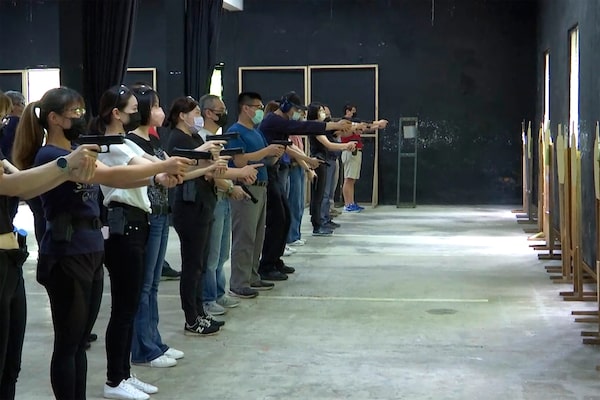
Taiwan has extremely restrictive laws about civilian ownership of firearms, but at a private civilian training organization named Polar Light in New Taipei City, Taiwan, on June 21, people are taught to handle at least airsoft guns that fire plastic projectiles.Wu Taijing/The Associated Press
It’s a balmy Sunday morning in Taiwan’s capital and dozens of Taipei residents are gathered in a downtown office building, preparing for war.
They’re not soldiers. They’re students, white-collar workers and retirees who have signed up for a civil defence course on how to cope with a military invasion by China.
The training camp is hosted by Kuma Academy, a non-profit that this month received a donation of US$20-million from Taiwanese microchip tycoon Robert Tsao. He wants the group, also known as Black Bear Academy, to turn three million Taiwanese into “civilian warriors” over the next few years.
It’s a sign of the times. For decades, Taiwan has lived under the threat of invasion from China. Beijing’s authoritarian rulers consider Taiwan a breakaway province even though the Chinese Communist Party, which seized power on the mainland more than 70 years ago, has never governed the island. Beijing has not ruled out the use of force to bring Taiwan under its control.
But 2022 has made the threat loom larger.
Russia’s attempt to subdue neighbouring Ukraine and China’s increasing menacing of Taiwan have sparked fresh interest in self-defence among the Asian territory’s 24 million residents.
Just last month, China staged its largest air and sea military drills around Taiwan to express displeasure at a visit to Taipei by U.S. House of Representatives Speaker Nancy Pelosi, the most senior American politician to travel there in 25 years. The live-fire exercises encircled the island and ballistic missiles launched by China flew over northern Taiwan.
Eve Chen, a 21-year-old university student, was one of the Kuma trainees on Sunday. She said she fears China may invade Taiwan. Ms. Chen said the fallout from Ms. Pelosi’s visit prompted her to consider the consequences of escalating tensions between Taiwan and the People’s Republic of China.
She said she feels “inspired by the Ukrainian people” and their fight against Russia, as well as the Hong Kong democracy movement’s fight against pro-Beijing forces in the former British colony.
Polling shows that while a majority of Taiwanese do not feel war with China is imminent, the number who fear it might be at hand has grown in 2022. The Taiwanese Public Opinion Foundation, an independent and non-partisan organization, said an August survey found 39 per cent of adults 20 years old and older felt war is “very likely” or “somewhat likely,” up from 26.6 per cent in a February poll. A slim majority of 53 per cent in the August poll said they consider imminent war is “not very likely” or “totally unlikely” – a drop from 62.9 per cent who expressed that opinion in February.
Chinese state media have reported Beijing plans to conduct further exercises on the Taiwan side of the median line in the waters separating the island from China. Taiwan has accused China of trying to normalize increasingly close military operations to its territory.
Ms. Chen said she finds friends and family in Taiwan shy away from talk of a possible war with China – a divisive subject around the dinner table. “My family tries to avoid having this kind of conversation at home – to dodge arguments.”
But she insisted it’s important. “We need to talk about it – to prepare our minds and be ready,” she said, adding a war effort would not just rely on armed forces but also support from civilians.
Kuma’s training camp offers a primer on basic first aid, modern warfare, emergency planning and debunking disinformation. People are taught to ready evacuation kits and apply tourniquets and find the nearest air raid shelter. Taiwan is now designating and readying shelters and Taipei alone has more than 4,600 locations. More advanced Kuma courses will include open-source intelligence gathering to fight information warfare or identify enemy movements.
Puma Shen, an assistant professor at National Taipei University’s graduate school of criminology and co-founder of Kuma, said academy courses fill up within 10 minutes of registration opening. He said, however, that he thinks many Taiwanese are still too passive about the threat China poses.
Mr. Shen, an expert in cognitive warfare, said China is constantly sowing disinformation in Taiwan, using YouTube and TikTok, to discourage the idea of resisting an invasion, by reinforcing the idea that allies such as the United States and Japan would not come to Taipei’s aid.
Kuma’s logo features a bear carrying a gun, but the academy is not training civilians on handling weapons. Taiwan has extremely restrictive laws about civilian ownership of firearms.
The academy eventually hopes one person in each of the nine million households in Taiwan can be trained in civil defence.
Other civilian training groups in Taiwan are seeing a similar spike in demand.
Forward Alliance, founded by former Taiwan special forces soldier Enoch Wu, seeks, among other things, to enhance crisis response capabilities among civilians. His next workshop takes place in the basement of a downtown Taipei church with a capacity for 60 students but that will double when training soon moves to a bigger venue. He said courses are booked through October.
Eric Wong, marketing manager at Polar Light, a combat-skills training company in New Taipei City, said bookings have nearly quadrupled this year over last from Taiwanese eager to train. Students can use airsoft guns that fire plastic projectiles as part of military simulation exercises.
Forward Alliance’s Mr. Wu said the lesson for Taiwan from Ukraine is “you cannot be overprepared” and that this could help deter conflict. “If Russia had known how difficult its campaign would be, maybe they would have paused and reconsidered.”
With a report from Annabelle Chih
 Steven Chase
Steven Chase